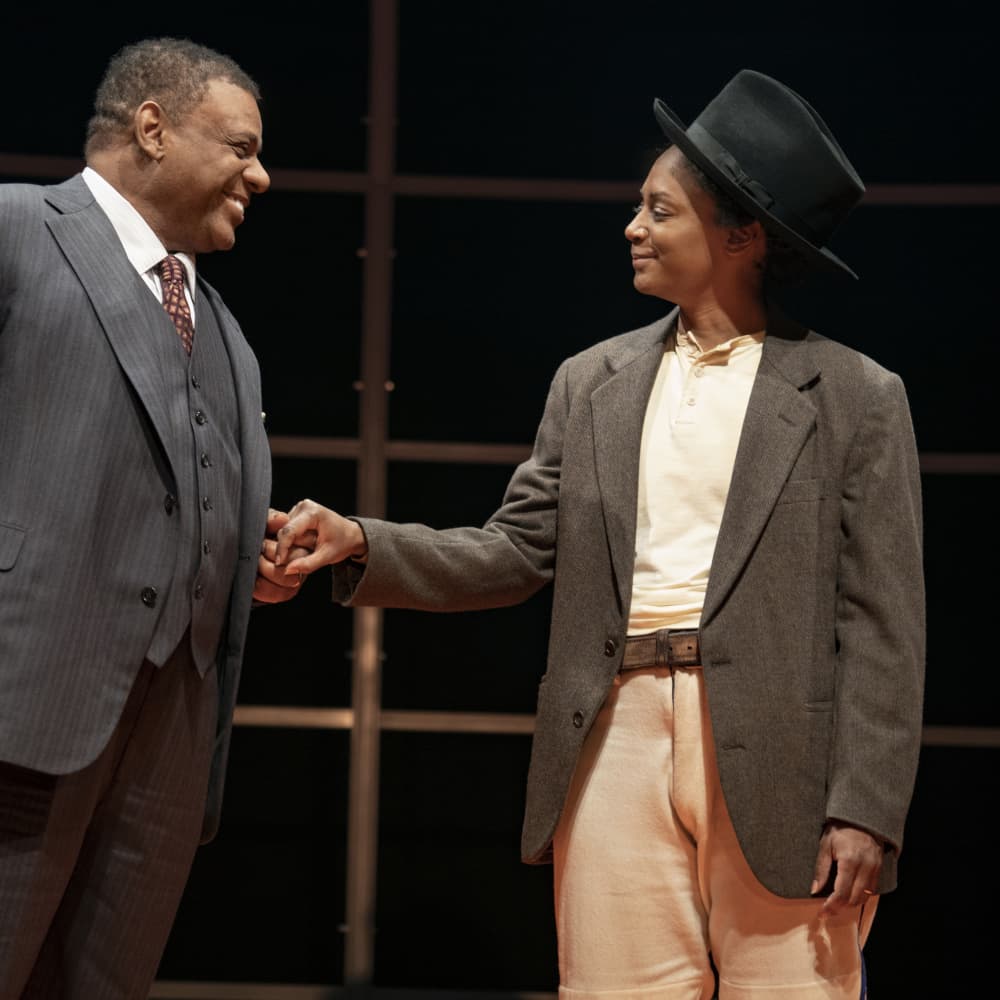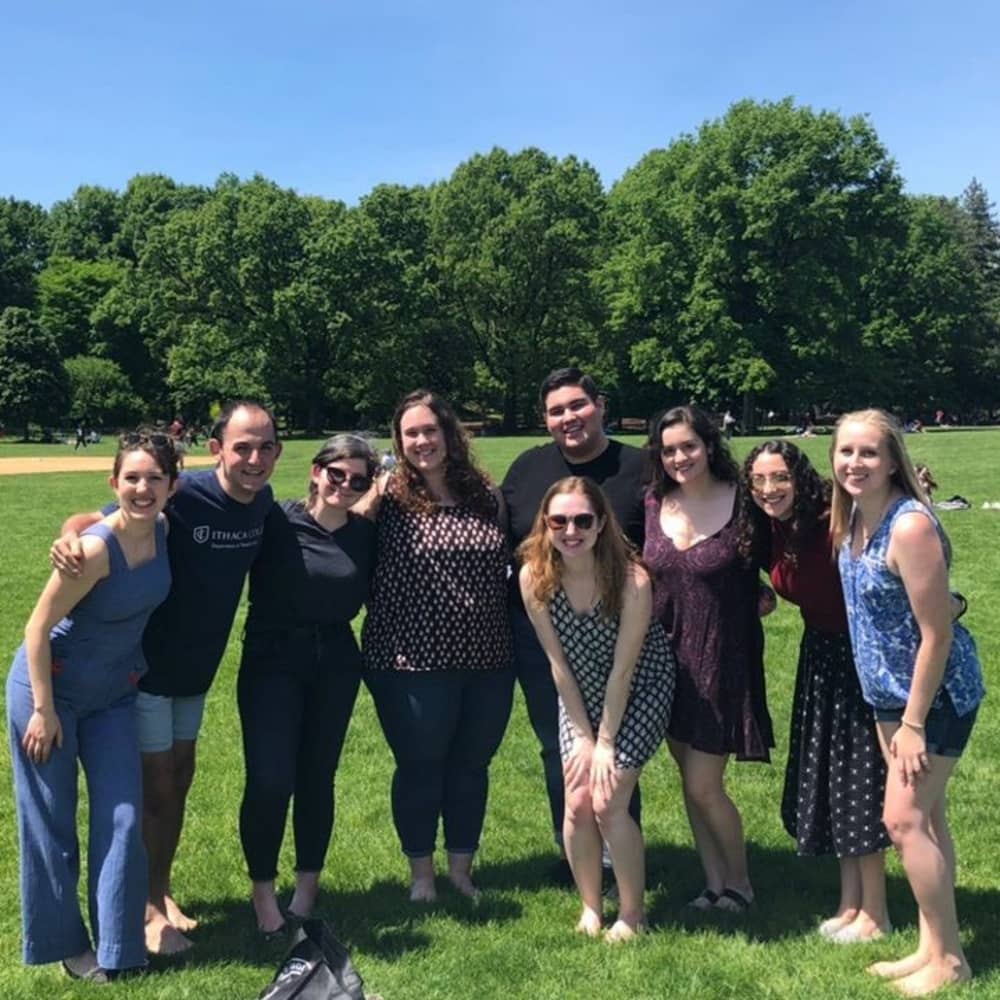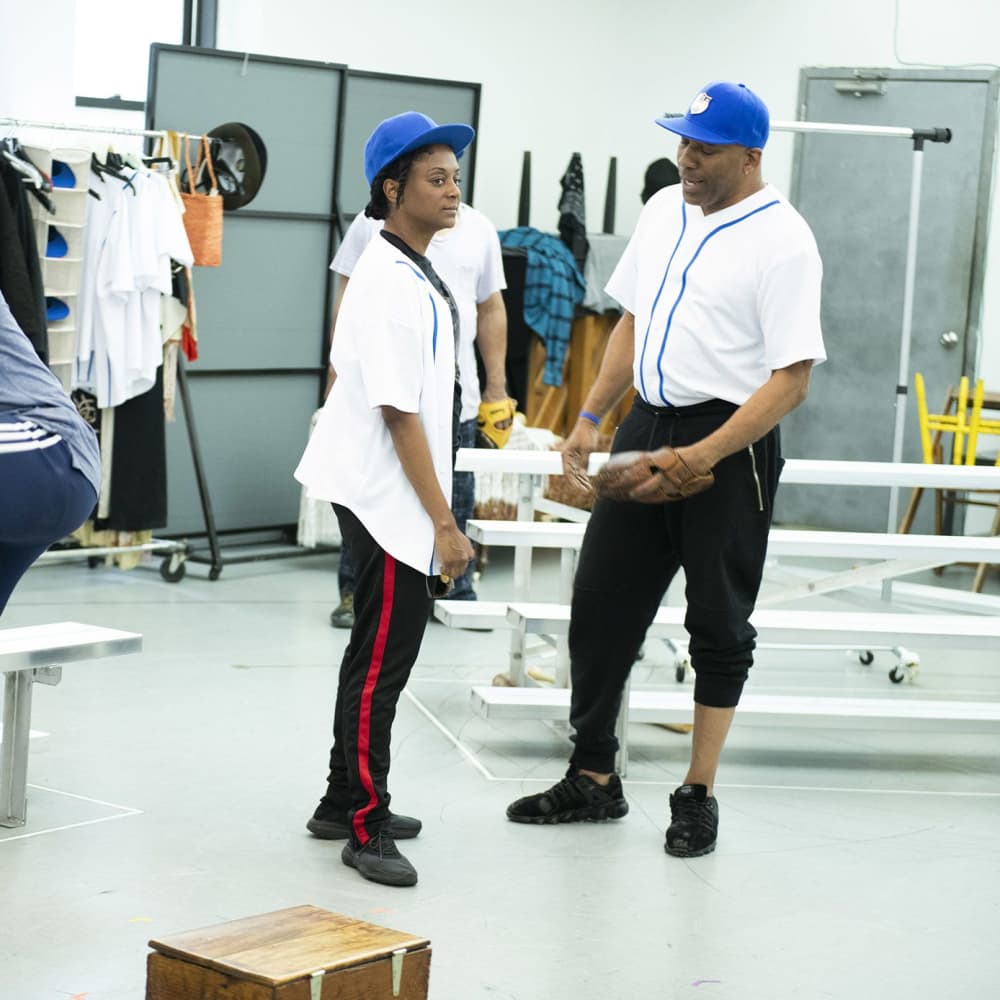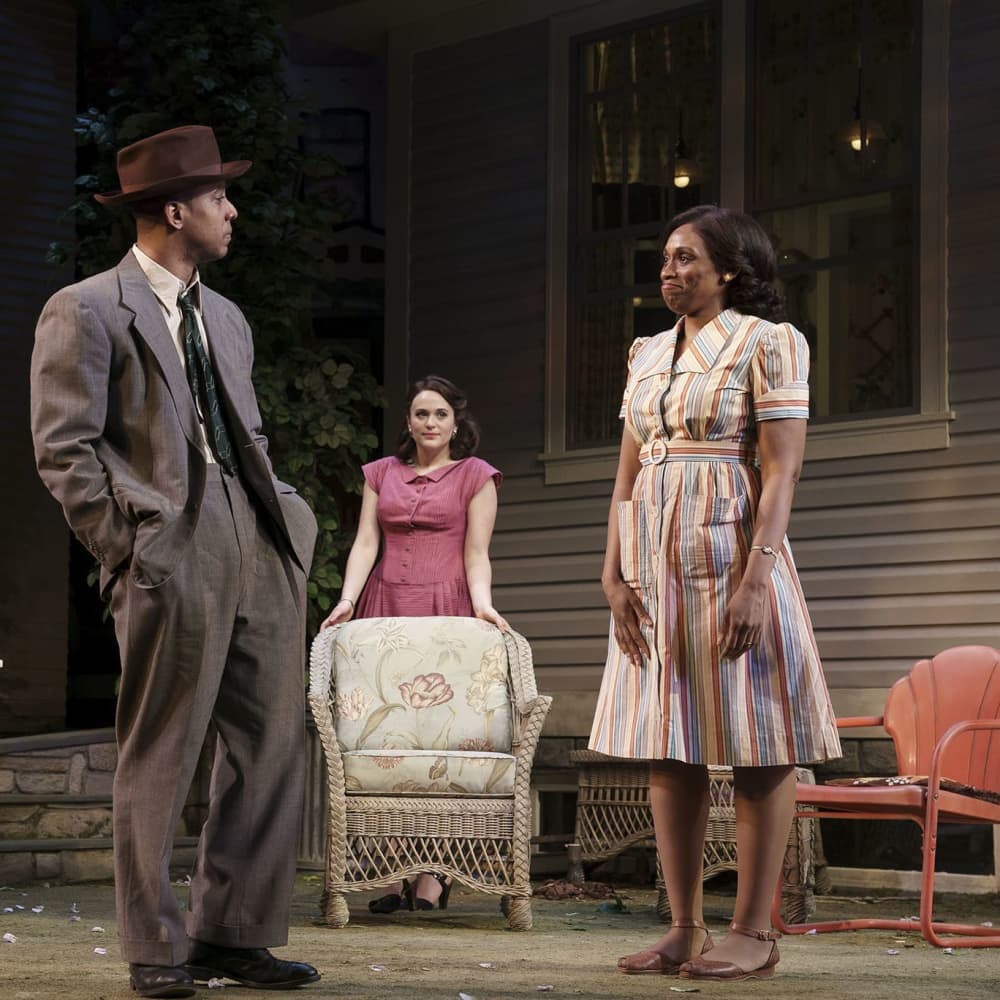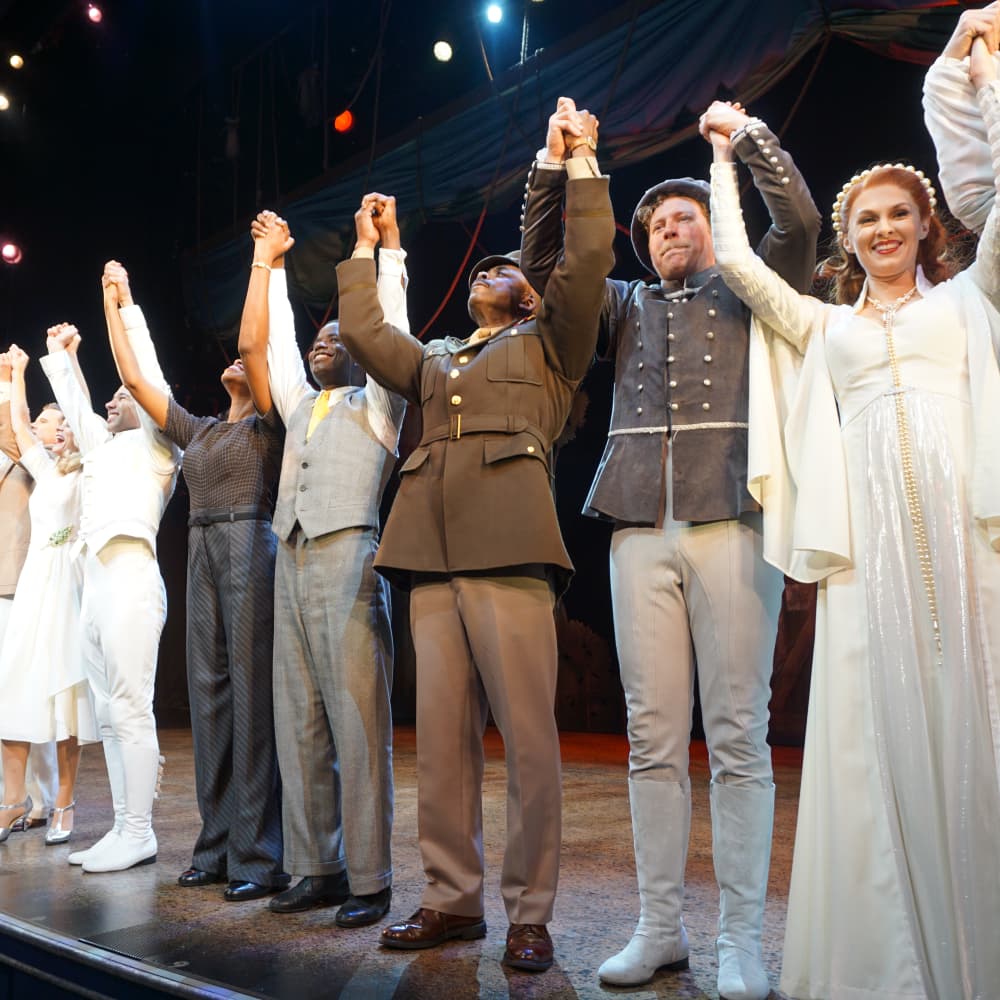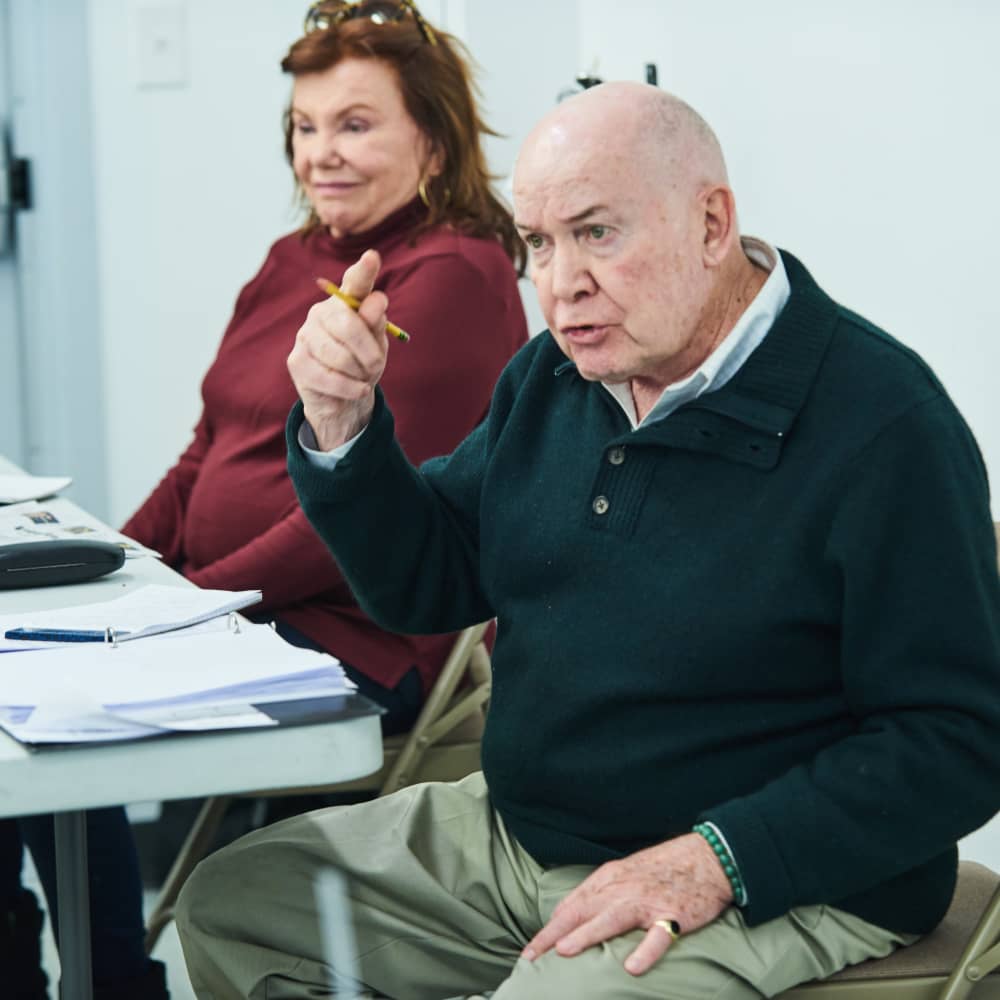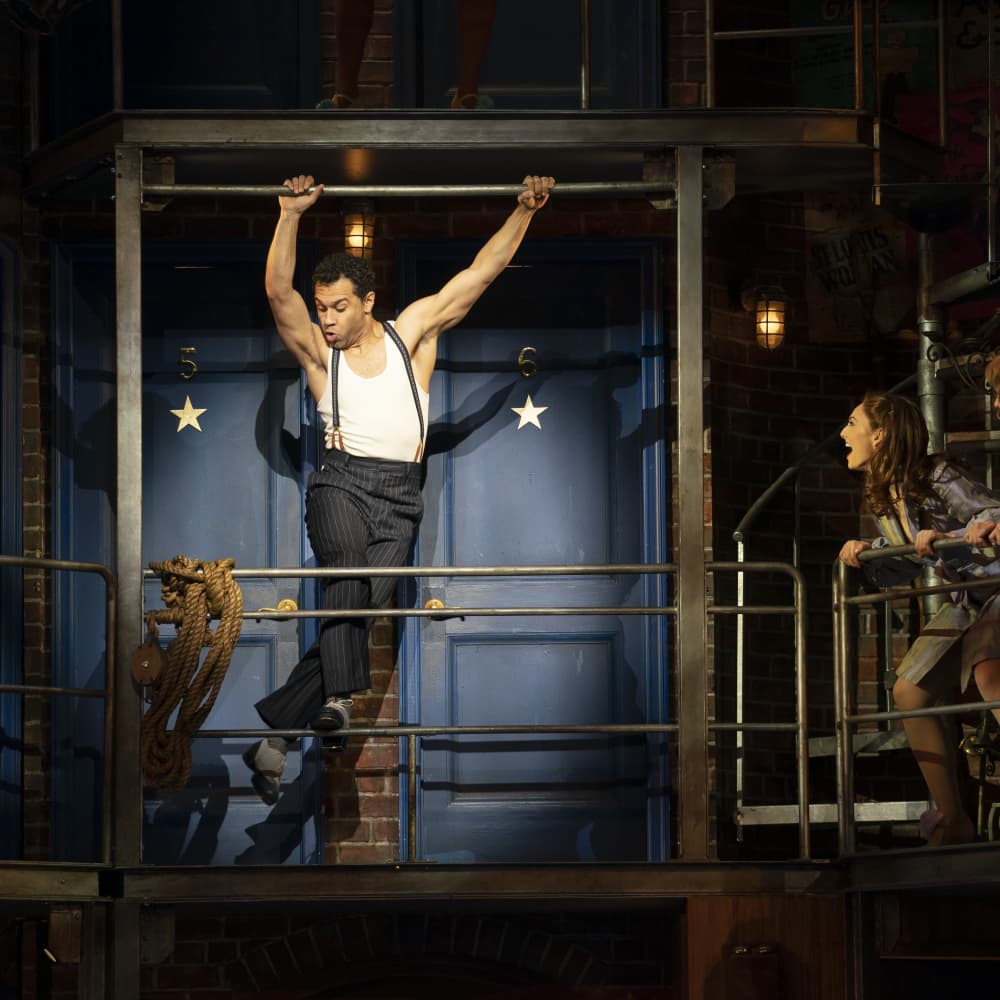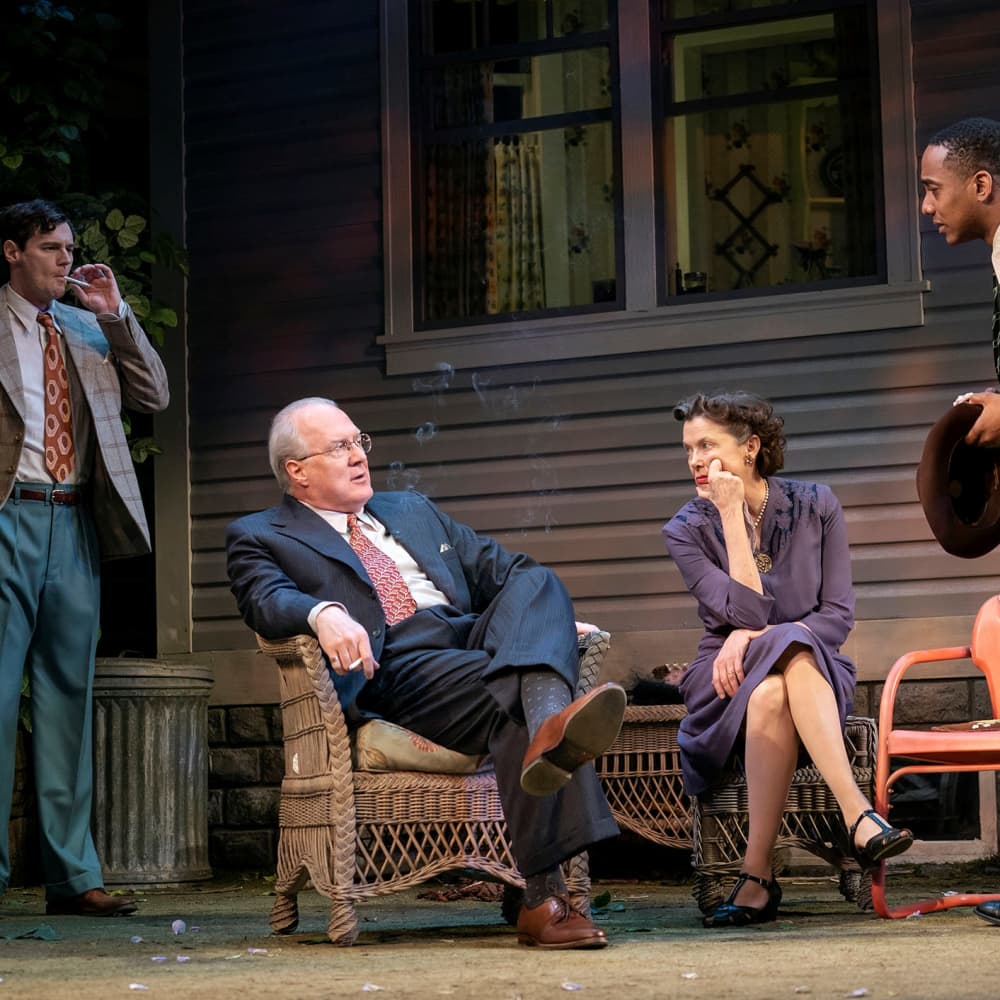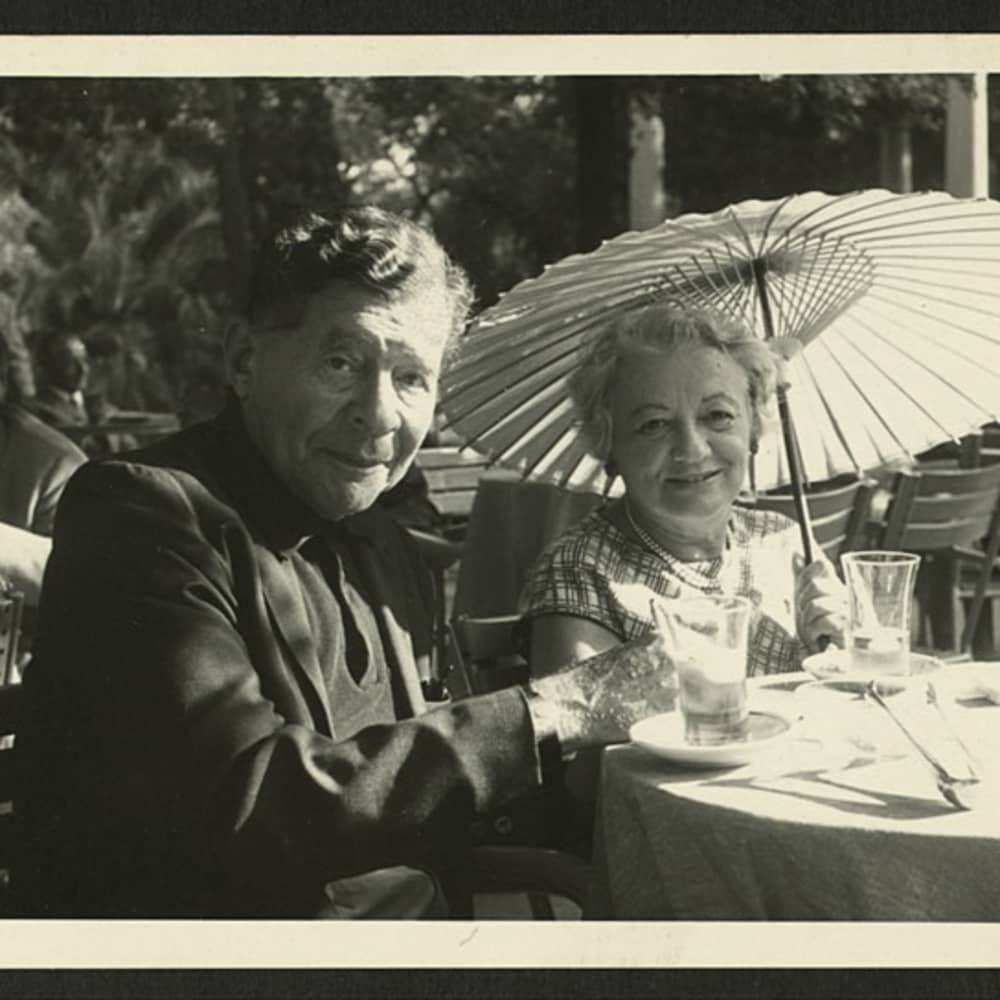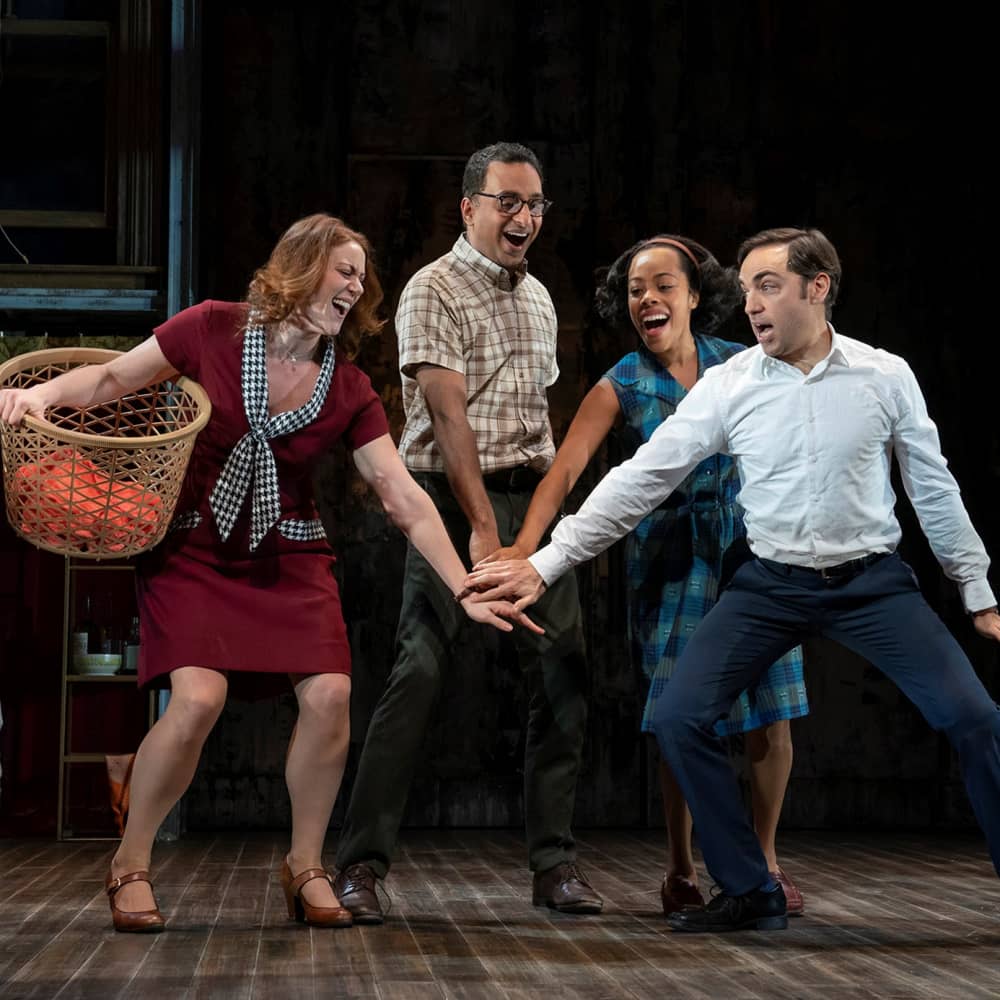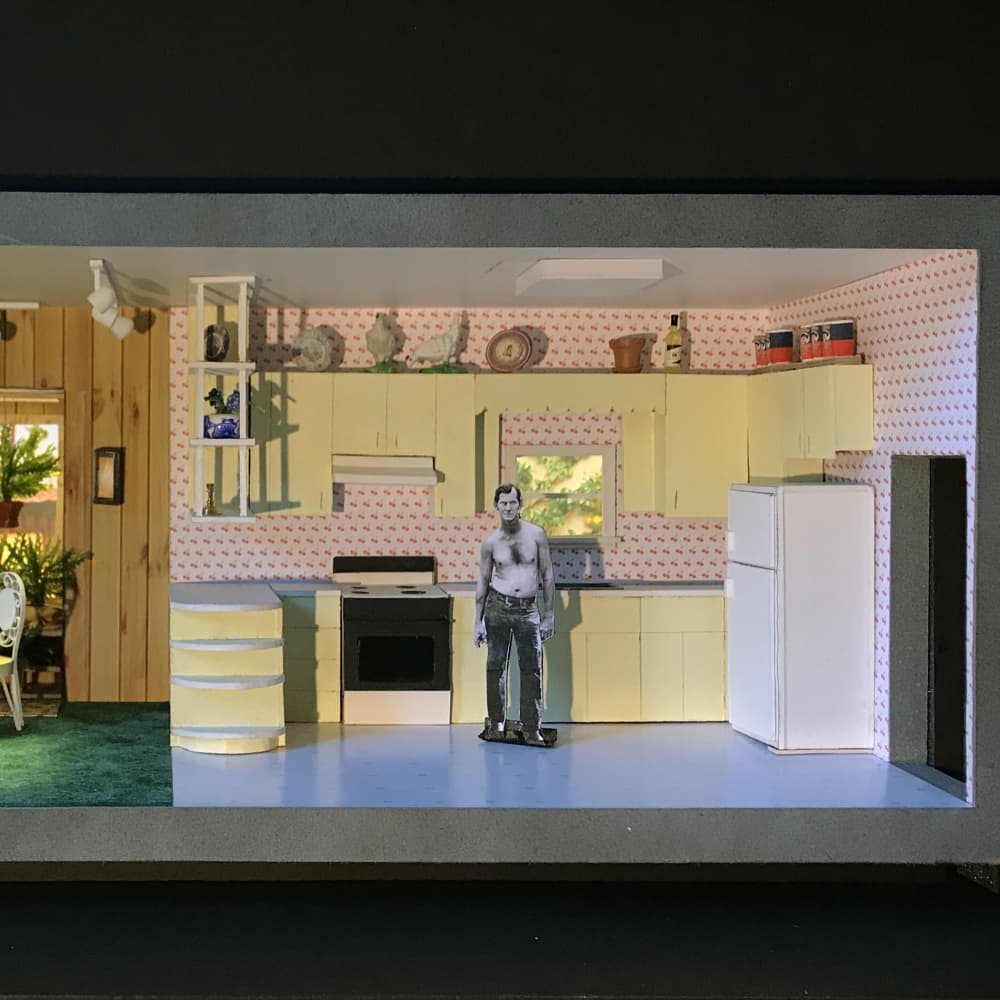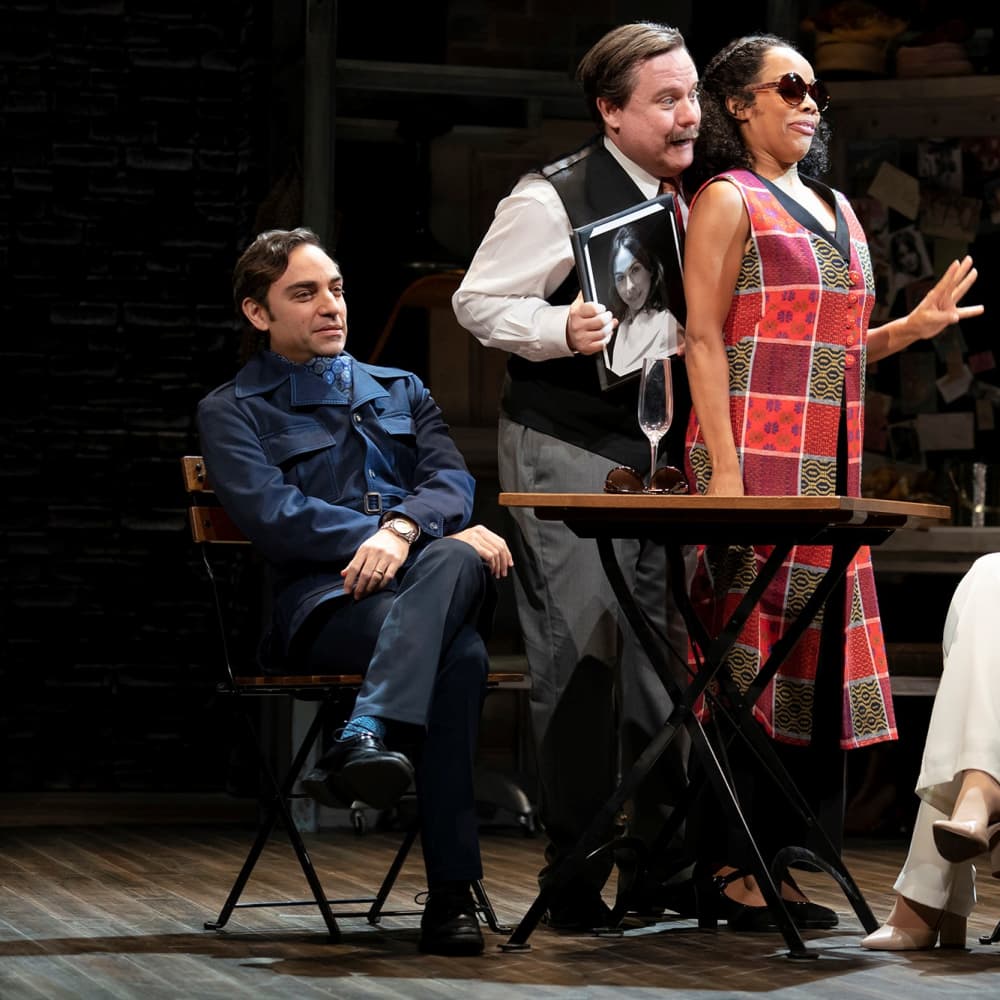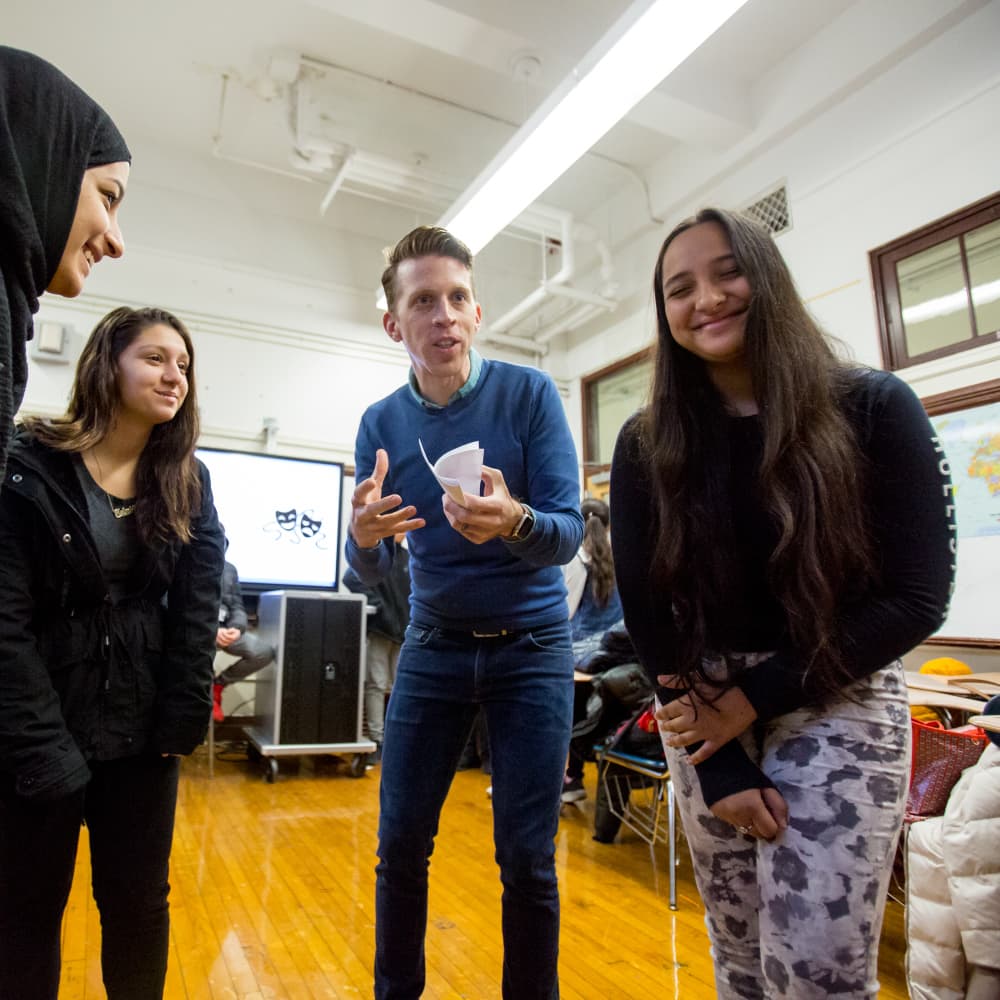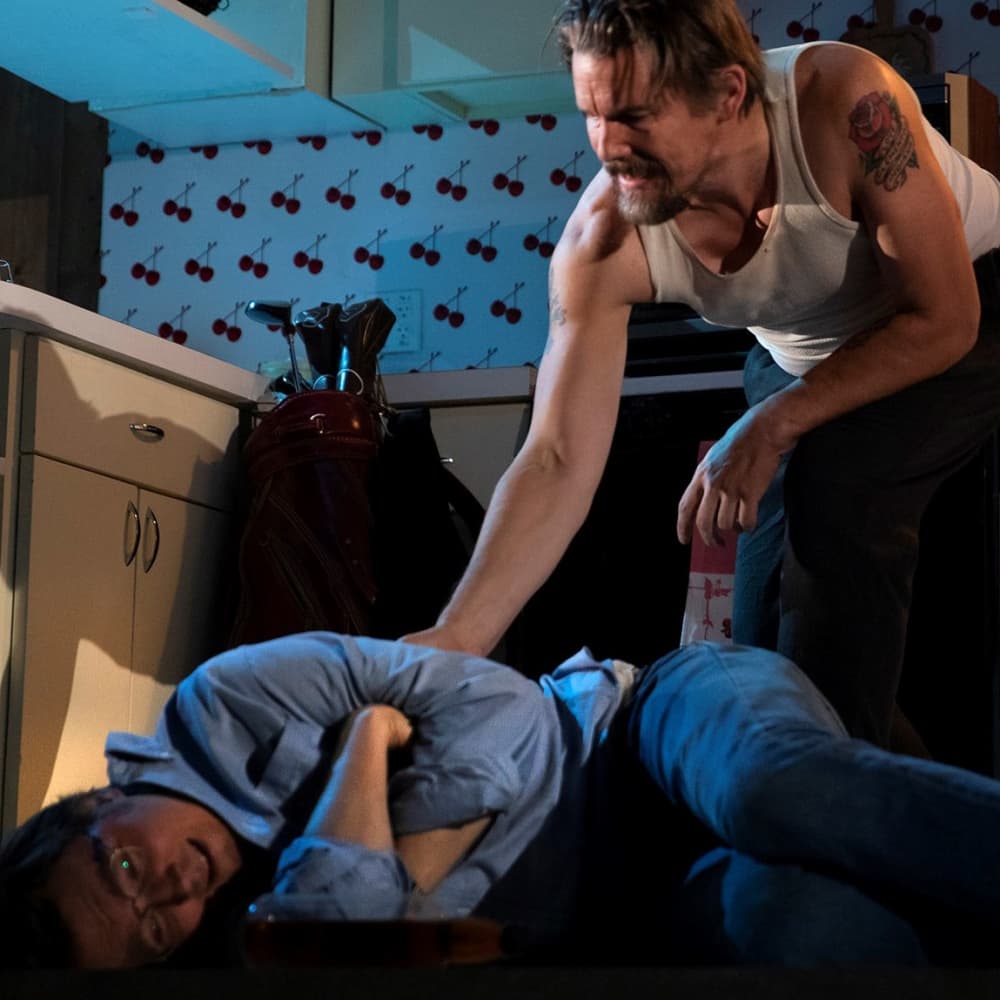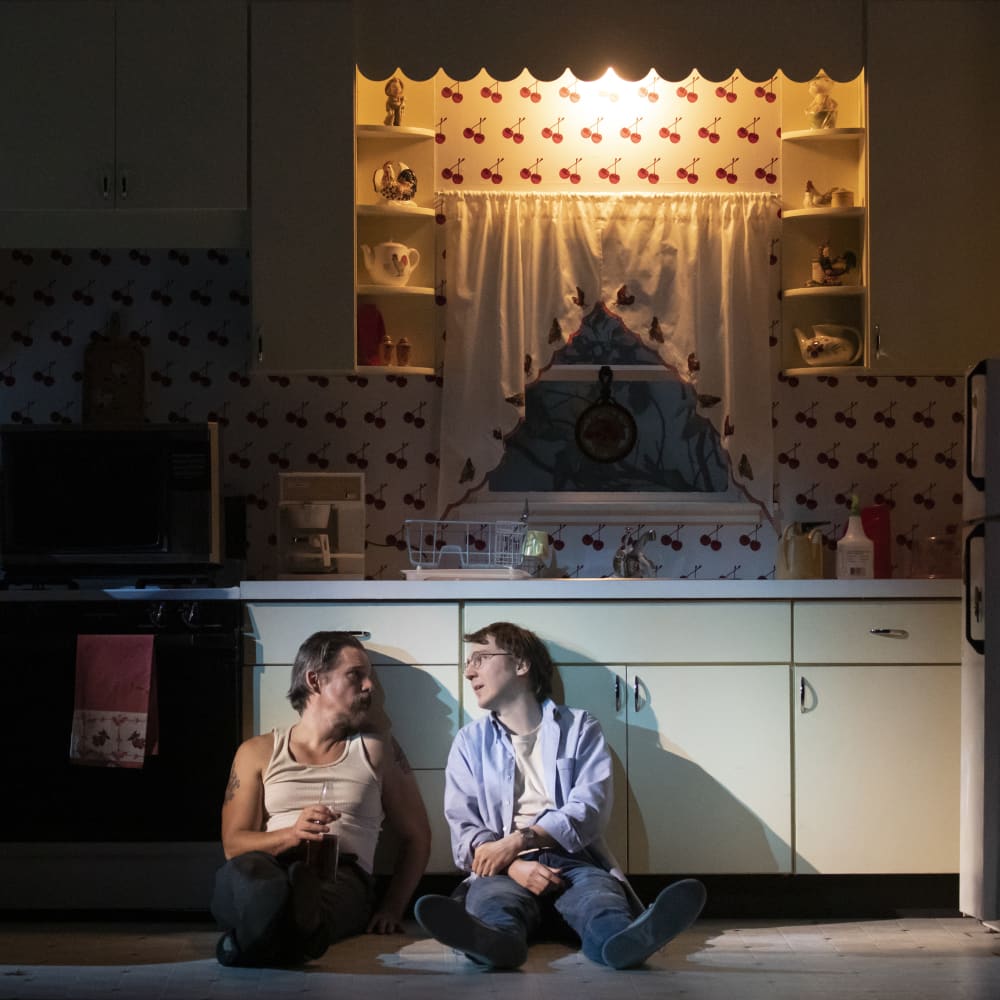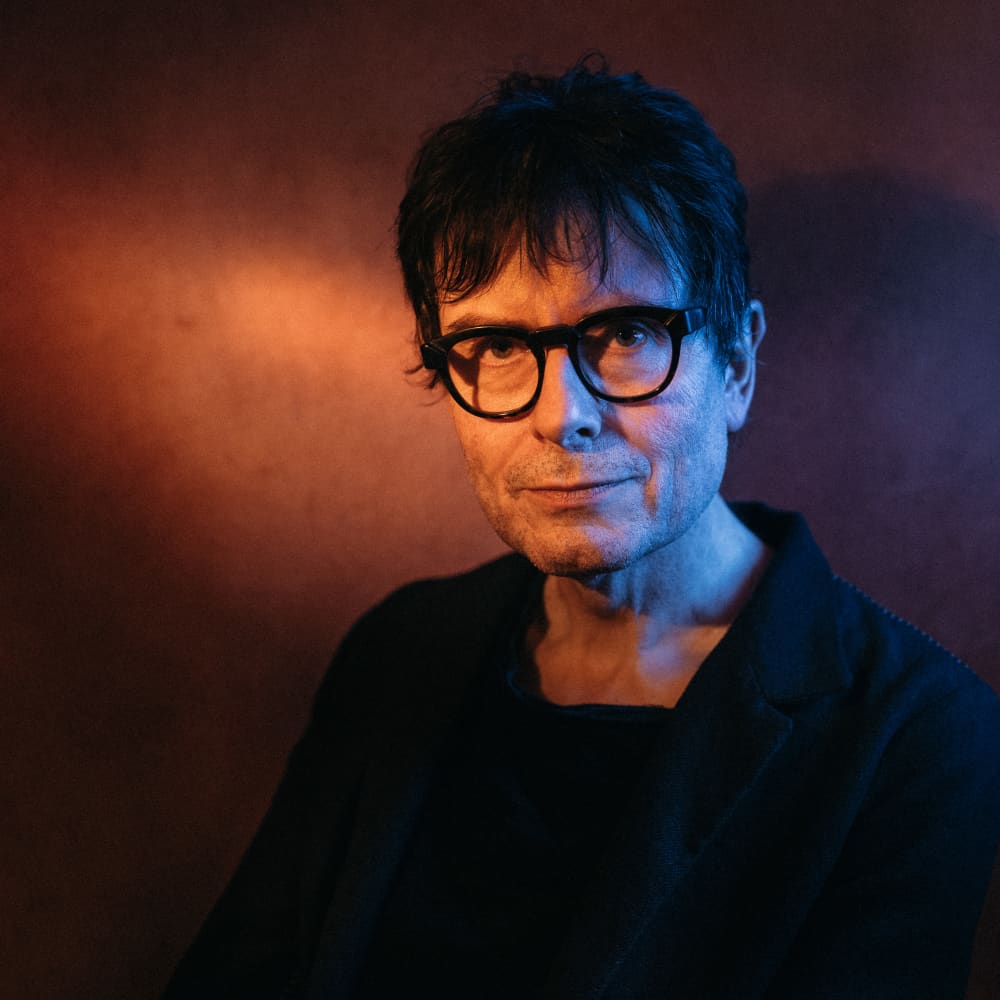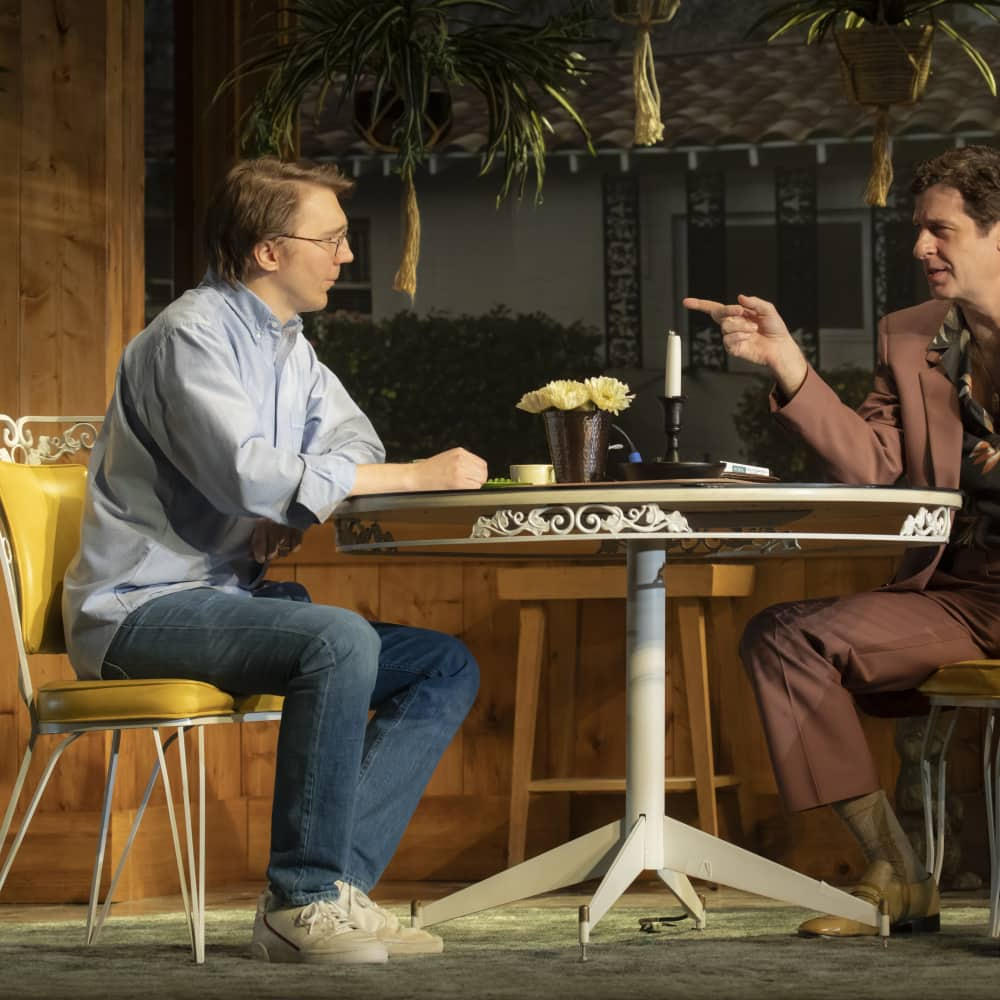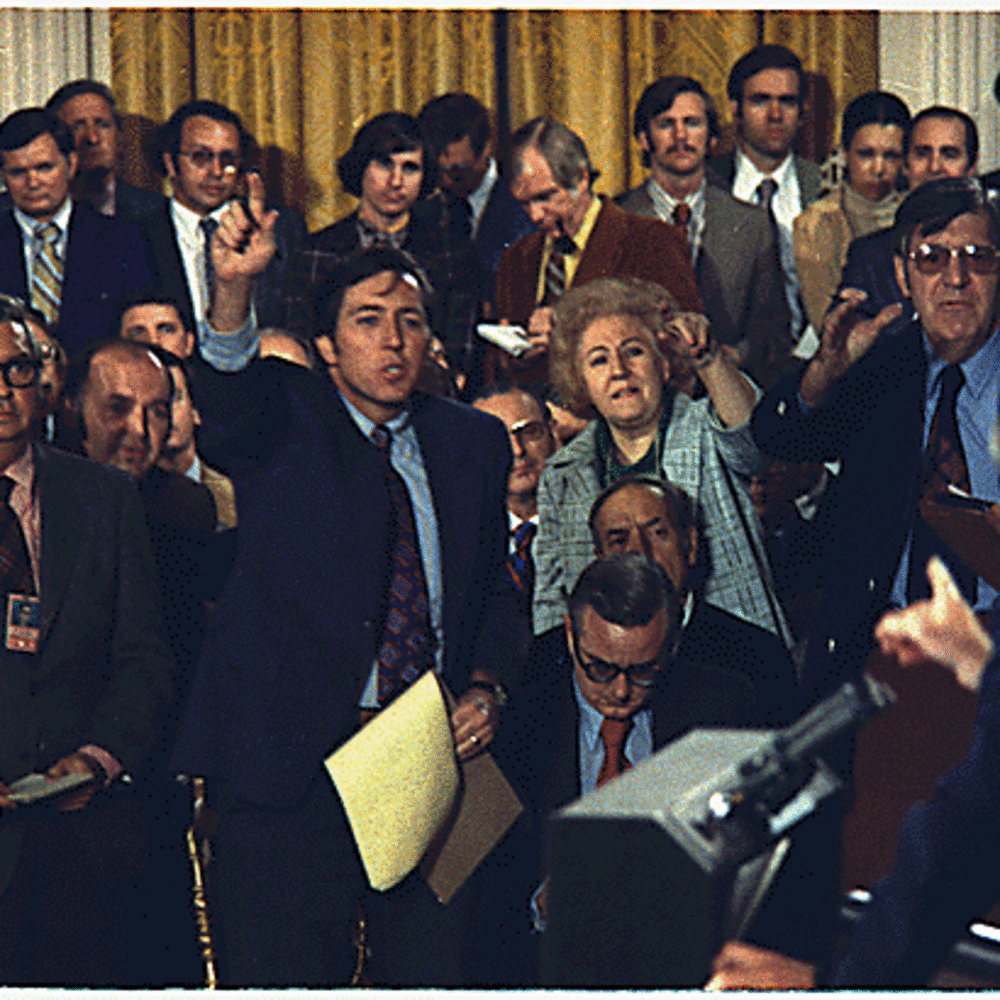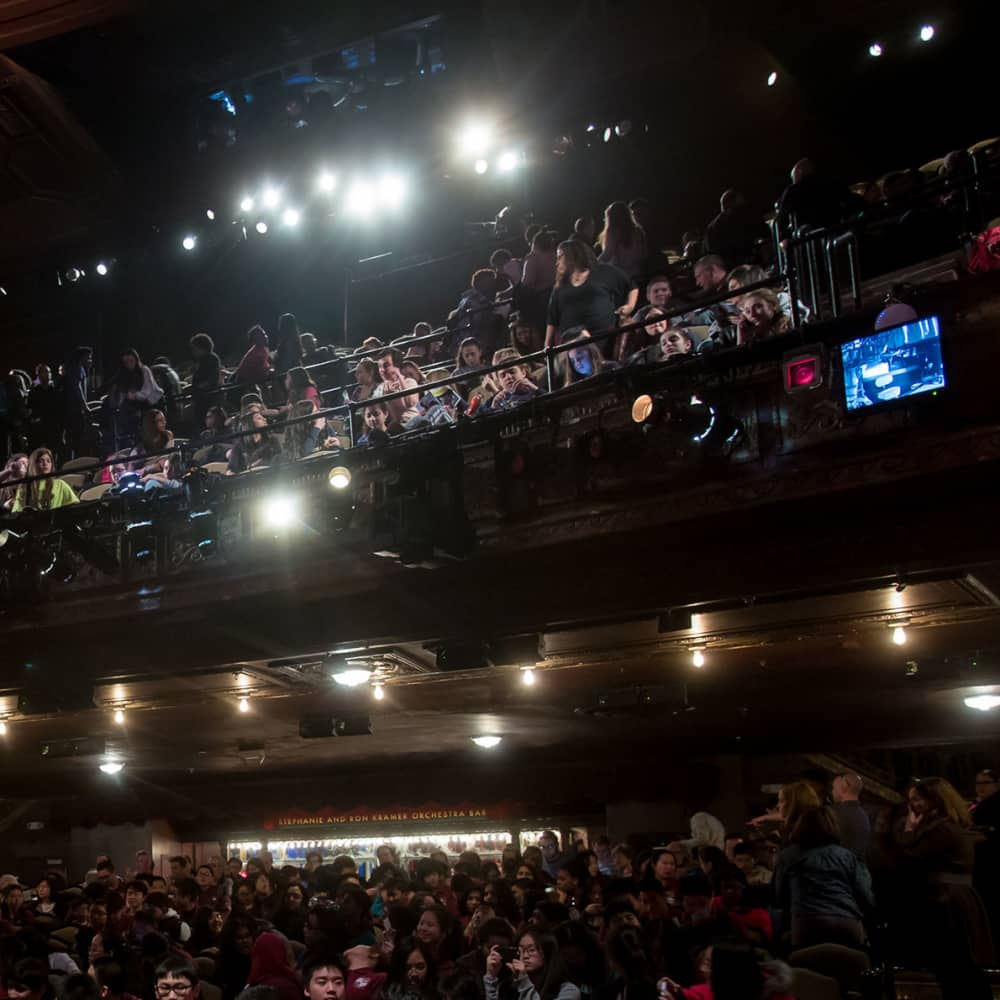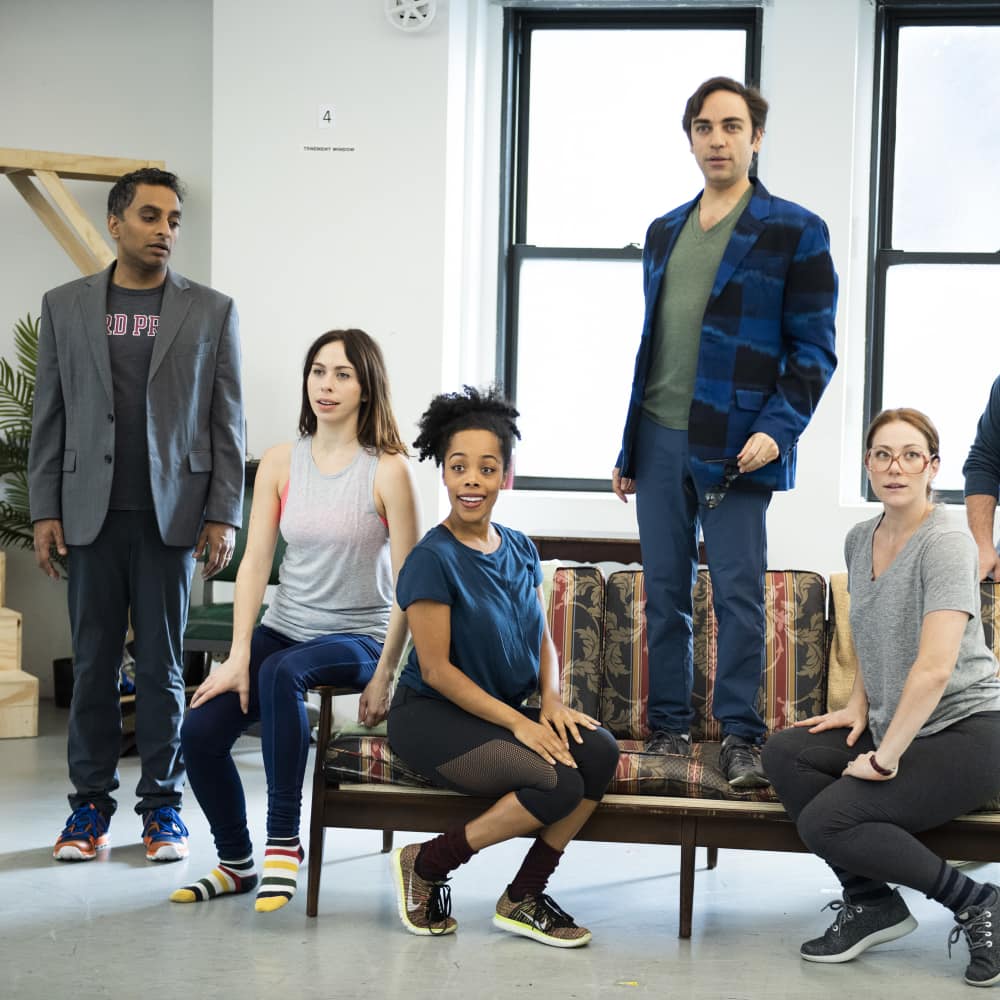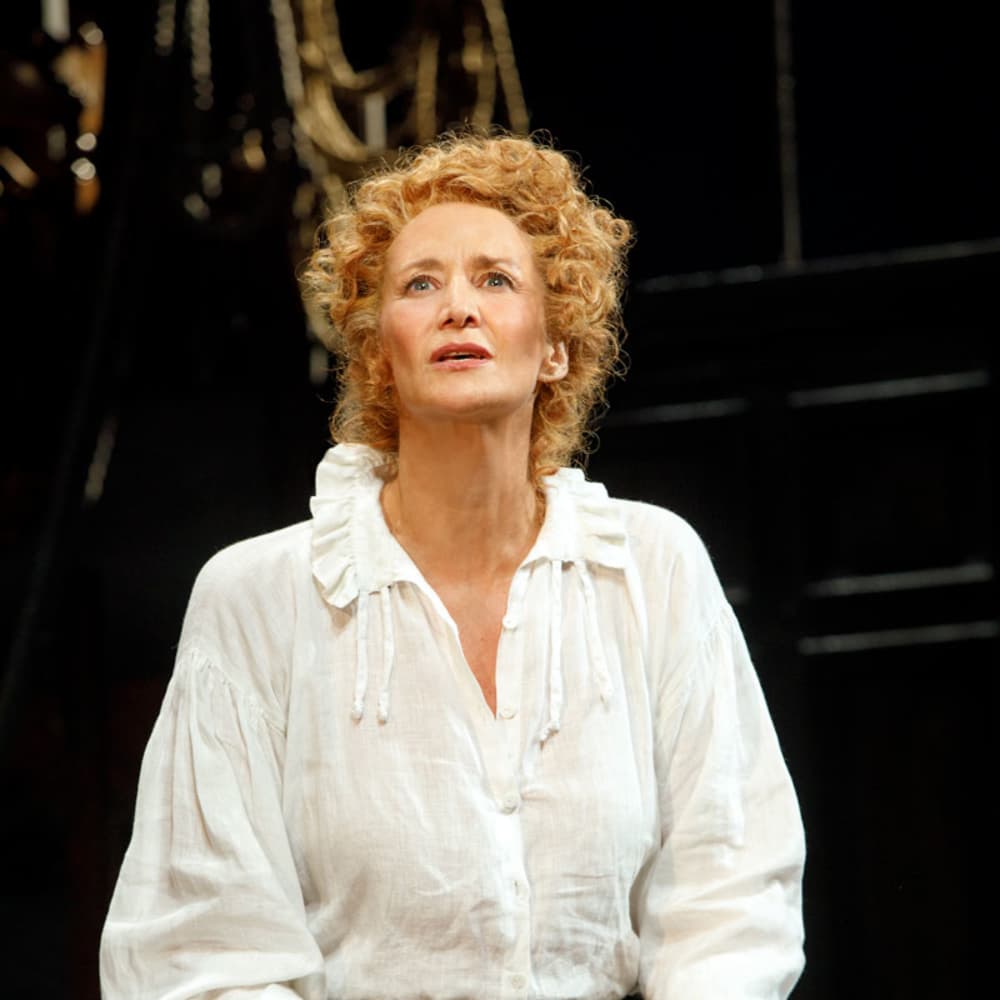Apologia:
A Conversation with Alexi Kaye Campbell
Posted on: November 2, 2018
On October 13, 2018, Alexi Kaye Campbell spoke about Apologia with education dramaturg Ted Sod as part of Roundabout Theatre Company’s lecture series.
Ted Sod: You were born in Athens, Greece, correct?
Alexi Kaye Campbell: I was indeed.
TS: And your father is Greek and your mother is British.
AKC: Correct on both counts.
TS: Your real surname is…
AKC: Komondouros.
TS: Campbell is your mother’s surname, which you adopted because you didn’t want to be pigeonholed when you were working as an actor.
AKC: I grew up in Greece, but when I was in my twenties I moved to London and trained to be an actor. When I started my career I decided to change my name to Alexi Campbell. Campbell, as you rightly pointed out, was my mother’s maiden name. Then I found myself in this slightly absurd situation when British Equity informed me that I wasn’t allowed to call myself Alexi Campbell because there was a Scottish juggler by the name of Alex Campbell and it was too similar! So, I then ended up taking the “K” from Komondouros as an initial, but I wrote it out. When I started writing plays, it didn’t seem right to change my name back because I’d already been working in the theatre for almost twenty years. I think my father regretted me not using my real surname, but that’s a whole different story…
TS: You went to primary school in Greece.
AKC: I did. I went to Greek school until the age of ten and then I switched to the British school in Athens. We were a bilingual family. We spoke English and Greek at home. I grew up with both languages.
TS: Are you still able to speak Greek?
AKC: Yes, fluently.
TS: I’m curious about your coming to America to attend Boston University.
AKC: I think that was to do with getting as far away from home as possible because I knew it was the easiest way to discover and reinvent myself. There’s a line in the play that Kristin says: “I had to cross an ocean.” And anyway, I was always drawn to America. I grew up in the 70s and the US was an exciting beacon of possibility. I had a friend who came to Boston and so I decided to follow him. I applied and luckily was accepted at BU because I was a terrible student at school. But I slipped through and I studied there for four years.
TS: English and American literature?
AKC: Yes. And then I trained to be an actor in London and since that time I’ve been living there.
TS: What was the event that made you say, “I’m done with acting; I want to write.”
AKC: That’s a good question. I was always drawn to theatre. I had wanted to work in the theatre since I was about 10 years old. I suppose it was a sense of vocation. I loved it. I was obsessed with Shakespeare and all British theatre. But as I grew older I realized that one of the realities of the profession as an actor is that you are disempowered a lot of the time. What I mean is that a lot of the casting process is so random. Obviously, it helps if you’re a talented actor, but sometimes it’s suitability for a part. You don’t have much control. My career as an actor was good enough, I was working at some excellent theatres, but I struggled as well, there were periods of unemployment. And even when I was working it wasn’t always ideal. Say you have four things that you tick off whenever you’re cast in a production: great part, great production, great director, great theatre. I usually ended up with two ticks, so it wasn’t quite doing it for me. I started writing at 40. But I believe that the 16 years of experience I had as an actor very much informed my work as a writer. I think if I hadn’t been an actor, I would not be writing the kinds of plays that I do and in the ways that I do, because a lot of it had been shaped by that experience.
TS: If my counting is correct, you’ve written six plays for the stage and a screenplay entitled Woman in Gold, with Helen Mirren, which was the highest grossing independent film of 2015. Is that true?
AKC: It did very well, yes.
TS: And The Pride, which is one of two plays of yours that have come to New York City, was done in London in 2008 and Apologia was done there initially in 2009.
AKC: Yes, they were timed very close to each other. I think The Pride was first done in December of 2008 and Apologia was first performed at the Bush Theatre in London in May of 2009. So just a few months’ difference.
TS: Apologia was commissioned by the artistic director at the Bush Theatre at that time, Josie Rourke.
AKC: It was indeed.
TS: Can you tell us how that came about? Did she approach you? Did you approach her? Did the idea of the play intrigue her? How did that all happen?
AKC: I had written The Pride and I had started sending it out to theatres and Josie, who was the artistic director and now has a very stellar career as a film and theatre director, read it and admired it. She was the first person who put her money, or at least the theatre’s money, where her mouth was and she commissioned me to write a play. But there was no pressure on the subject matter. I just said I was interested in exploring a certain territory and she gave me “carte blanche” to go ahead and write the play. I presented her with a first draft, which I thought was not very good, but she had absolute faith in it and in me and she said, “Let’s program it.” So, that’s what she did and I was suddenly in a position where I had about four months to work on the play quite rigorously to get it into a better state.
TS: Now, in that version, Kristin was British.
AKC: She was.
TS: Will you talk to us about the revival in 2017 in which Stockard appeared, at Trafalgar Studios?
AKC: So, originally we did the play at the Bush Theatre in 2009 and it was well received and people seemed to enjoy it. There were producers who were interested in trying to give it another life. So, there was a concerted effort to find another home for it in the West End, but it didn’t work out. And then a few years later, there was interest from the States, and American actors, so I thought, let me just try this, and make Kristin American. I decided this because I knew that any actor playing Kristin would not want to do it in a foreign accent – the part is challenging enough as it is. In the beginning, there was a part of me that was worried that I was making this choice for the wrong reasons. But when we did a reading of the American version, I felt it worked better than the original and so I was able to support that idea wholly and with no doubt. I found that there was something poignant about having an American Kristin who had moved away from home to “foreign soil”, and suddenly meets this younger American who shows up at her home. It added another dimension to the play which I enjoyed. I didn’t think that it compromised the original version and I was happy about that. So, now there are these two versions of the play in print.
TS: By the other American, you mean Trudi?
AKC: I mean Trudi, yes.
TS: When we talked for the playgoers guide interview, I asked you what inspired you to write the play and you said you’ve always been interested in themes of inheritance. I believe that’s a theme in The Pride as well. Can you talk a bit about why that’s important to you as a writer?
AKC: I don’t know why I get drawn to certain themes or ideas. You just follow your instinct and see where that takes you. I think I’m interested in the confluence between the personal and the political and where those two meet. For instance, there were things that happened to my own family – my parents’ divorce, for example - which were directly connected to movements in society, none of it happens in isolation. And, as you know, during the 60s and 70s there were huge social and cultural shifts. A lot of the things we take for granted now -- I suppose what you’d call liberal values – were taking root then, especially regarding movements such as feminism, civil rights, gay rights. So I wanted to look at that period – those seismic shifts – and explore the legacies of that time and what the next generation had inherited, both personally and politically.
TS: I watch the play and I’m stunned by the passion that has never left Kristin or her comrade, Hugh, to try to do the right thing socially and politically. When she says that line to her son, Peter, about the work that he’s doing -- what word does she use? Work is an…?
AKC: Offering.
TS: Offering. It feels so foreign now, in our upside down world where greed just seems to have taken over. I love that you have a character like Kristin in your play who has dug in, for better or for worse, and still wants social and political change to happen so badly.
AKC: I’m glad you describe her that way. I think it is pivotal to the play. The character I was trying to create was someone who was on the frontlines and who believes in specific causes. She is an idealist who made sacrifices. She really does feel strongly about what is articulated in the final act of the play by the description of the mask that Trudi gives her: that the personal and the public are connected and interdependent. I think that, even now, if you didn’t have resistance, if you didn’t have people who really believe in justice and equality and in fighting the good fight, things would be a lot worse than they are. It’s easy to take things for granted. Of course when you’re young it’s easy to be blinded by anger and say, “’look at this mess I’ve inherited!” I am also aware that there is some mocking of the 60s mindset, some people think of it as a cliché, like Claire does in the play. But for me perhaps, it is more personal, simply because I am gay. I am fully aware that if it wasn’t for people like Kristin and Hugh, who were pioneers in the 60s and 70s, who really put themselves on the line, it would have been a lot harder for people like me to live with the freedoms I enjoy. I’m very grateful for those changes that happened and I suppose I wanted to honor those people who gave a lot of their time and energy to those causes.
TS: I’m tremendously moved by the end when Kristin has her self-reckoning. What I’ve come to understand is that -- and I don’t know if this is still true -- at the time of her divorce in Britain, Kristin’s husband would have been given custody of their children. Is that true?
AKC: I think it’s interesting that just before Kristin has this visceral response to the past and the choices she’s made, she articulates the fact that she was living in a world which pretty much forced her to choose between being a mother and being a creative contributor to the world. And I think that’s true. Society was shaped in that way. There’s a lot of my own personal history woven into the play, not that my mother is anything like Kristin, but it was much harder for a woman in the 70s to make those choices. In some ways, Kristin did have her arm – and her soul, as she says in the play – twisted.
TS: I sense that Kristin is still hurt by the fact that her ex-husband just took their children and she really had very little recourse. Her sons are fascinating to me because they haven’t really been able to understand her perspective at all and the memoir she writes is a catalyst for that.
AKC: I think that when there’s any kind of trauma in a family, there’s a part of you that freezes in the moment of trauma. The boys suffered trauma when they were children because they were very close to their mother and suddenly she wasn’t there anymore. To some extent, I believe that there is a part of them that is frozen in that moment. You go through your whole life not really addressing those issues. And then something happens that means you can no longer dismiss or ignore it, and in this case you’re absolutely right. The publication of her book makes it very real and raw again so that that part of the boys which is in some ways frozen in time comes to the fore. I think we all create narratives for ourselves to survive. That’s what we do. And then, when we all express those narratives, we realize that our stories don’t always match.
TS: I’m curious about the inspiration for the characters of Claire and Trudi because they are so different. Trudi is just lovely even though I don’t think I could ever be friends with her. I have to say that on some level, she really is a Christian. I love Claire because she makes a viable case for her choice to be in a serial drama on television or whatever she calls it. I think she’s right -- if you come from poverty, and I certainly have, you don’t want to go back.
AKC: Absolutely. It’s easy sometimes for more privileged middle-class people to make judgements about that kind of thing. But for me the act of writing a play is an exercise in exploring one’s multiple personalities! You realize you have all these different sides to yourself and a lot of times you’re finding ways to answer questions that you’ve been carrying around with you for a long time. There’s a bit of me in all of those characters. With Trudi, I was very interested in trying to call out people’s prejudice. I was trying to set up these characters who you think you know, but by the end you realize it’s never that simple. That happens to me a lot. I meet someone and I think I know who they are and then gradually I see that they’re not what I thought they were at all. At moments like that I’m forced to face my own prejudice and that’s always instructive.
TS: Trudi does seem intimidated by Kristin’s intelligence, but Claire doesn’t seem to be bothered by it.
AKC: No, she’s tough. Well, she’s a survivor. As you say, she’s come from a background that has given her a lot of steel.
TS: When I interviewed Stockard, I asked, “What’s going on between Kristin and those significant others of her sons?” And she said, “Well, I wouldn’t want Kristin for a mother-in-law. Would you?” I think what’s interesting is the fact that Kristin is really like a lot of women I know from New York City -- they can get right to the core if they want to.
AKC: I agree and I think that’s why Stockard is just absolutely brilliant in the part and I feel so hugely grateful that she’s playing it.
TS: The only other character we haven’t really discussed is Hugh, Kristin’s gay male friend. That is a 42-year-old friendship. That happens a lot, in my understanding, between gay men and straight women. There’s some…
AKC: Synergy, yes.
TS: Is that something you’ve experienced yourself or just something that you’ve seen? Because it’s rich. It feels real to me.
AKC: I’ve got lots of very close female friends, but I’ve also met people like Hugh. I didn’t have anyone specific in mind, but I’ve seen relationships like the one Kristin and Hugh have. I thought it was very important in the play to have somebody who was completely on Kristin’s side and as he says, is her witness for the defense. There’s something about relationships where there’s no sexual dimension. People get very close in a different way and can become emotionally dependent on each other. At some point they become almost symbiotic and can finish each other’s sentences. I’ve seen quite a few friendships like that.
TS: I want to talk about the story that Simon tells Kristin at the beginning of act two because I sat in the audience thinking, this is going to end badly. This is going to be one of those abuse stories where a young boy is taken advantage of. But it doesn’t turn out that way. Can you talk a bit about finding that? Was that a discovery?
AKC: There was a discovery in that I knew that Simon has two objectives in that scene. One is that he comes to punish her. And the reason he comes to punish her is he’s just read the book. He just feels that it is a rejection. And, of course, he’s a storyteller so he will punish her by telling a story of something that happened to him. And the second objective is to articulate his truth - the very act of speaking something which he’s never expressed before, and which is connected to his mental and emotional state. There is a kind of release in that. I didn’t want to sensationalize it by turning it into a story of sexual abuse but he did experience this moment in his childhood which jarred itself in his mind and he needs to get it out in some way. The memory of that night in Genoa comes to represent all the feelings he had as an adolescent missing his mother. Those two objectives of Simon’s – to speak his truth, and to punish his mother – form the basis of that scene.
Audience Question 1: Did you write the roles of the two brothers to be played by a particular actor that you knew? How did you make the decision that the brothers never interacted? Did you ever imagine a scene with them together or did you always want to keep them separate?
AKC: That’s a really interesting question because what happened was in the first draft of the play, Simon came on earlier. He came on in the dinner scene and I realized something happened which has to do with tone. The first half of the play has a comical dimension; that was my intention. I wanted it to be teetering between drama and something more comical. But, of course, the minute Simon came on you couldn’t do that, because the tone suddenly shifted. In the second draft, I kept Simon’s entrance separate. That made sense because you come back after the interval and meet the play on new terms. Something’s changed. It also felt dramatically correct because I think that scene with Simon is the beginning of Kristin’s reckoning. It takes place in the middle of the night and needs to feel almost like a dream, it sits separately from the comic naturalism of Act One. In the original production, we had two actors playing the brothers and then I went to see the play in Germany and they had one actor playing both roles and I liked that because it raised the play slightly out of its naturalism and gave it a more poetic quality.
Audience Question 2: Coming back to the play in this current climate, do you think that the kind of radicalism that helps move society forward necessitates the personal cost that the play explores?
AKC: I think it probably does. I can’t imagine that giving a great deal of your time to political or social causes won’t take its toll on your personal life, how is that even possible? And yes, in times such as now these questions are becoming more urgent than ever. When we played the play in London, I liked the fact that a lot of the younger people were very much on Kristin’s side. It’s interesting because it’s split a lot of times. People either move toward her or judge her but it was a lot of the younger people who admired her and understood the sacrifices she made. I wrote this play ten years ago, but I was saying on the first day of rehearsals that I’m glad it’s taken this much time to come to the States because suddenly the subjects the play discusses -patriarchy and feminism amongst others - suddenly feel more topical than ever.
Audience Question 3: Getting back to the question of the brothers, what was the thinking about naming them Simon and Peter?
AKC: I’m going to be absolutely honest with you. I wrote this play and when I finished it, there was all these Christian themes and motifs that seem to be woven into it. I’m not religious, and yet the play is full of religious references. At the risk of sounding hugely pretentious some of the choices you make when you are writing are conscious and some aren’t and you have to trust them. The names of the characters – Kristin, Simon, Peter – could be seen as being allegorical, but that wasn’t the intention when I chose them.
Audience Question 4: You have the characters reference Giotto’s Lamentation, Anna Karenina and A Doll’s House as ways to explore agency and femininity and motherhood. How did you find yourself using those as reference points for those characters?
AKC: It’s difficult to think back now because I wrote the play a long time ago. I write in bursts. Some of the choices I made, I don’t really know why I made them. Some of it is conscious and some of it isn’t. I realize that on this play, which is all about questioning motherhood and female empowerment, there are references to great works of art which have also questioned female identity in patriarchal contexts. And I promise you that’s not in any way self-aggrandizing – I’m not equating this with any of those pieces of work! -- but I think it just happened naturally. Anna Karenina is probably my favorite book and Doll’s House I also love, but it was not conscious. I really didn’t sit and think, now I’m going to find another feminist reference. I didn’t do that. You tell a story, characters express themselves, that’s all.
Audience Question 5: Kristin’s profession is art history, but I found that an interesting choice because it’s such a conservative profession, especially with her focusing on the Renaissance. I’m thinking that in the 1970s, for her to go to grad school and become a writer and professor was in itself a radical act when she was also a mom. I’m wondering why you chose that for her profession?
AKC: In Britain in the seventies there was an art historian named John Berger who wrote a seminal book called Ways of Seeing, and he was a very pivotal cultural figure at that period . Mostly because he did a series on television that was seen by many thousands of people. He was a Marxist art historian. I’d read his work and I was drawn to the idea of looking at art from a radical political perspective. And yes, for that to come from a woman is even more unconventional than it is coming from a man, for the reasons you’ve just mentioned. The way I tried to weave it in is that even when Kristin’s talking about Giotto, she talks about it from a Marxist perspective. That’s what I was interested in exploring. Kristin keeps going on and on about the responsibility of the artist and the social changes that art can bring about and she sees art as being in conflict with religion. Ultimately, I kind of feel that both art and religion do offer stories and versions of reality which try and help us to make life more bearable and point us in a certain direction. There is a link between religion and art, I feel. Kristin sees Giotto as somebody who is trying to take religious motifs and move them beyond religion and give them a humanist dimension.
TS: The political changes happening in this country and elsewhere are mindboggling and scary for me. The only hope I have is art. That movie, Philomena with Judi Dench, turned Ireland against the Catholic church. They now have gay marriage and women have the right to an abortion. I may be wrong, but it seems that that movie, that work of art did that. Do you follow what I’m saying?
AKC: I do, absolutely. It’s an interesting question because you never want any form of art to be either moralizing or didactic or anything like that. You want to invite different ways of seeing. Ultimately, I think art is about making it easier to see that there are lots of different perspectives and hopefully we will be able work our way through discord.
Audience Question 6: Just to follow up on art causing change, when Kristin and Trudi are going through the history of the mask, Kristin suddenly realizes that it’s highly appropriate to her way of thinking -- this idea of women leading community in an entirely different way.
AKC: I think Kristin sees her role in some ways as a protector and nurturer, which traditionally we associate with motherhood. Hugh says to Peter, “She did it all for you.” And Peter says, “How was any of that for us?” Then Kristin and Trudi come back in the room, so the question is left hovering in the air, and then the mask articulates the answer to that question: that the personal and the public are completely interdependent. We are in a moment of great crisis and it’s interesting to think the model isn’t really working - we seem to be destroying everything, including the environment. So, if women are to start having a more influential and positive role on where we go as a species, as a planet, then we need to rethink the patriarchal models which have been around for hundreds of years because they’re not working anymore. And I think the empowerment of women – and the feminine in general – are pivotal to that.


